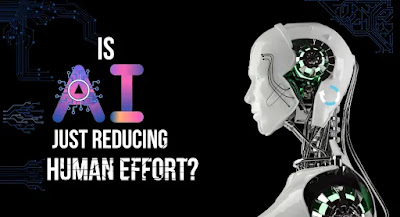Being interested in new technology and discovering ways to earn money can be very useful and rewarding. With curiosity and willingness to explore new ideas, I always try to stay up-to-date with the latest trends and developments in the tech and business worlds and find opportunities to enhance my skills and income. Keep exploring and learning surely discover exciting paths to success and fulfillment.
Thursday, 20 April 2023
AI reduces human effort
How AI is Reducing Human Effort
Artificial Intelligence (AI) is revolutionizing the way we work and live, and one of its most significant benefits is the reduction of human effort. By automating routine tasks, streamlining processes, and providing intelligent insights, AI is freeing up time and resources, and enabling us to focus on more important and valuable activities.
Here are some of the ways AI is reducing human effort:
Automation of Routine Tasks
AI is capable of automating repetitive and mundane tasks, such as data entry, scheduling, and report generation. This not only saves time but also reduces the risk of errors and increases accuracy. By delegating these tasks to machines, humans can focus on more complex and creative activities that require their unique skills and expertise.
Streamlining Processes
AI can analyze large amounts of data and identify patterns, trends, and insights that can help organizations optimize their processes and workflows. By identifying inefficiencies and bottlenecks, AI can suggest improvements that can reduce time and resources required to complete tasks. This not only saves money but also improves the quality of work and enhances customer satisfaction.
Enhancing Decision-Making
AI can process vast amounts of data and provide intelligent insights that can help humans make better decisions. For example, AI-powered predictive analytics can forecast trends and outcomes, enabling businesses to make informed decisions about product development, marketing, and sales. This reduces the risk of making wrong decisions and helps businesses stay ahead of the competition.
Personalization of Services
AI-powered chatbots and virtual assistants can provide personalized services to customers, reducing the need for human intervention. By analyzing customer data and preferences, AI can offer customized recommendations and solutions, enhancing customer experience and satisfaction.
Improving Safety and Security
AI can also enhance safety and security by detecting and preventing fraud, cyberattacks, and other security threats. By analyzing large amounts of data and identifying suspicious patterns, AI can alert humans to potential risks and enable them to take preventive action. This not only protects organizations from financial losses and reputational damage but also ensures the safety of their customers and employees.
In conclusion, AI is reducing human effort by automating routine tasks, streamlining processes, enhancing decision-making, personalizing services, and improving safety and security. As AI continues to evolve and mature, it will likely play an even more significant role in reducing human effort and enhancing productivity and efficiency.
Improved accuracy and consistency: One of the major benefits of AI is its ability to perform tasks with a high degree of accuracy and consistency. Unlike humans, who may make errors due to fatigue, distraction, or other factors, AI systems can perform tasks with precision and without getting tired or bored.
Increased productivity: By automating repetitive or mundane tasks, AI can help organizations increase productivity and reduce the time it takes to complete certain tasks. This allows employees to focus on more important and value-added activities, such as strategy and innovation.
Better decision-making: AI can help organizations make better and more informed decisions by analyzing large amounts of data and identifying patterns and trends that may not be visible to humans. This can help organizations identify opportunities for growth, mitigate risks, and improve overall performance.
Enhanced customer experience: AI can be used to provide personalized and timely interactions with customers, such as through chatbots or virtual assistants. This can help improve customer satisfaction and loyalty by providing a more convenient and efficient experience.
Cost savings: By reducing the need for human labor, AI can help organizations save on labor costs and improve profitability. Additionally, AI can help reduce waste and improve efficiency, which can lead to further cost savings.
Overall, while there may be concerns about the impact of AI on employment and society, there are many benefits to be gained from its use. By reducing human effort, AI can help organizations become more productive, efficient, and competitive, while also improving the overall customer experience.
Subscribe to:
Post Comments (Atom)


No comments:
Post a Comment